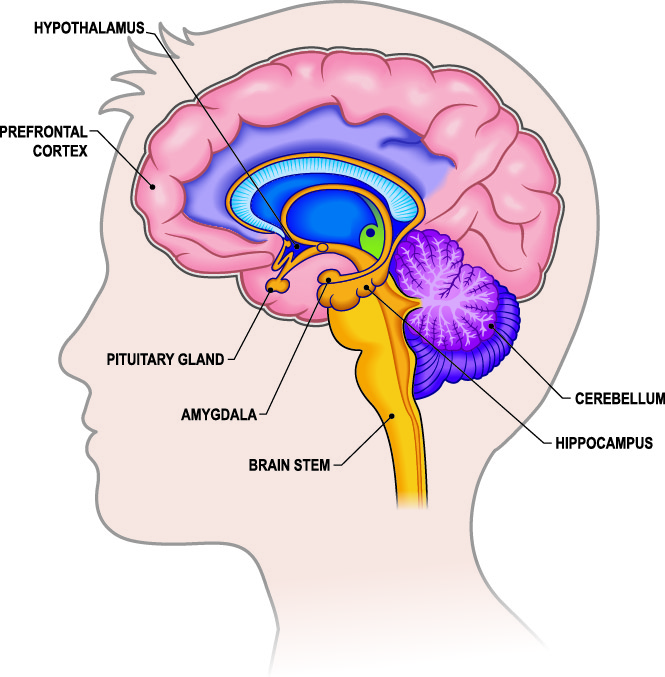We all came into this world expecting something kinder. Maybe not perfect, but at least peaceful. Safe. Fair. But somewhere along the way, that vision broke.
And when it broke, some of us broke with it.
We didn’t arrive with armor. We weren’t warned about the emotional earthquakes that shake our inner foundations. There were happy memories, sure, but sometimes the trauma looms louder, casting long shadows over everything else.
If you’re reading this, you might feel like something inside of you has changed in a way you can’t name or undo. Maybe you’ve asked yourself a terrifying question:
Can emotional trauma cause brain damage?
It’s not just a question rooted in fear. It’s rooted in experience, in foggy memory, endless anxiety, numbed joy, and a gnawing sense that you’re no longer fully you.
So let’s talk about it. Gently. Thoroughly. Honestly.
Because what you’re feeling isn’t all in your head, and you’re not alone.
How Trauma Rewrites the Brain – A Survival System in Overdrive
Emotional trauma isn’t “just” emotional. It has a biological impact.
Think of your brain like a finely tuned symphony. Trauma storms in like a rogue drummer, beating too fast, too loud, and drowning out everything else.
According to extensive neuroscience research, trauma activates our survival circuitry, especially the amygdala, hippocampus, and prefrontal cortex.

Here’s how each part is affected:
Amygdala (Fear Response Center)The amygdala learns from threat and detects danger. After trauma, it becomes hyperactive, constantly sounding false alarms. This makes you feel jumpy, irritable, or overwhelmed, even in safe environments.
Source: URMC Neuroscience
Hippocampus (Memory and Time Orientation) Responsible for memory and distinguishing past from present, this region often shrinks in trauma survivors. The result? Confused memories, mental fog, and flashbacks.
Source: NIH – PMC7774817
Prefrontal Cortex (Emotional Regulation & Reasoning) The rational part of the brain that calms you down. Under chronic stress, it goes offline, making it harder to think clearly, regulate emotions, or stay present.
Source: Everyday Health
This is not damage in the traditional sense, it’s maladaptive rewiring. But when the stress persists, these changes can feel like a war zone etched into your neural map.
Living the Fallout – How Trauma Shows Up Daily
Trauma doesn’t politely knock. It barges in, and sometimes, it never leaves.
You may feel like your brain is betraying you. You can’t concentrate. You forget simple things. You’re exhausted even after sleeping. Small triggers cause big reactions. Sound familiar?
These are not personal failings. They are neurological symptoms of trauma.

Common Signs of Trauma’s Effect on Brain & Body:
- Difficulty focusing or making decisions
- Memory lapses or confusion
- Flashbacks or intrusive thoughts
- Trouble sleeping or frequent nightmares
- Chronic fatigue or physical pain (headaches, muscle tension)
- Overreactions to minor stressors
- Feeling disconnected from reality or from others
- Anxiety and mood swings
According to the American Brain Foundation, chronic trauma disrupts multiple systems, including hormone balance, immune response, and cardiovascular regulation. These aren’t isolated emotional issues, they’re whole-body impacts.
When trauma goes unaddressed, it embeds itself in the brain-body feedback loop. What starts in the mind doesn’t stay there, it echoes into your health, relationships, and identity.
Is This “Brain Damage”? What the Science Really Says
Let’s confront the core question again:
Can emotional trauma cause brain damage?
The answer isn’t simple, but here’s the truth:
Emotional trauma does alter brain structure and function in measurable ways.
Brain scans of PTSD patients often reveal a smaller hippocampus, enlarged amygdala, and underactive prefrontal cortex.
Source: PMC3181836
Chronic cortisol (stress hormone) floods neurons and can inhibit neurogenesis, the brain’s ability to grow new cells.
Source: New Medical Choices
One study likens emotional trauma to a type of mild traumatic brain injury, due to its impact on neural circuitry and hormonal regulation.
Source: Highland Springs Clinic
However, and this is critical:
These changes are not always permanent. The brain can heal.
Thanks to neuroplasticity, our brains are constantly reshaping based on experience. What trauma disrupts, healing can rebuild.
So no, trauma isn’t the same as irreversible brain damage.
But yes, its effects are real, biological, and serious.
Healing Is Possible – Rewiring a Wounded Brain
Now for the most important part:
Your brain wants to heal. And it can.
The brain’s plasticity means it can form new neural pathways, restore balance to disrupted circuits, and even regrow tissue in certain areas (like the hippocampus) when supported.

Evidence-Based Healing Approaches:
Trauma-Focused Therapy (e.g. EMDR, TF-CBT): Proven to reduce PTSD symptoms and normalize brain activity.
Source: Integrative Life Center
Mindfulness Meditation: Increases gray matter in the prefrontal cortex and reduces amygdala activation.
Source: PMC7774817
Movement Therapy (e.g. Yoga, Walking, Dance): Helps regulate the nervous system, improve mood, and discharge trauma-stored tension.
Source: Whole Wellness Therapy
Social Connection: Safe relationships rewire our brain’s attachment systems.
Source: Good Health Psych
Every healing action you take, no matter how small, sends a signal to your brain that it’s safe to build again.
Gentle Steps Toward Recovery – Where to Begin
Healing from trauma is not a sprint. It’s a slow, sacred walk back home to yourself.

Here are actionable, science-supported ways to begin:
- Start Small with Stillness: Practice mindful breathing or grounding techniques for 3–5 minutes daily.
- Seek Safe People: Connect with trauma-informed therapists, support groups, or just one person who listens without judgment.
- Build a Healing Routine: Regular meals, consistent sleep, gentle movement—all rebuild neurological stability.
- Move Your Body: Trauma often freezes in muscle memory. Even light stretching can create emotional release.
- Educate Yourself: Understanding trauma’s effects reduces shame and empowers action.
- Name What You Feel: Emotional literacy calms the amygdala and strengthens the prefrontal cortex.
- Protect Your Peace: Limit toxic stimuli, news, social media, or people who retraumatize.
And most importantly: Celebrate your progress, even if it feels tiny.
Conclusion – You’re Not Broken. You’re Becoming.
Let’s revisit the question one last time: Can emotional trauma cause brain damage?Yes, in many ways, it can change your brain. It can cloud your thoughts, interrupt your memory, and hijack your emotions.
But no, you are not broken beyond repair.
These changes are not fixed. They are patterns, and patterns can be undone, retrained, and replaced. Just as trauma rewires the brain toward fear, love and safety can rewire it toward hope.
If you’ve read this far, that tells me one thing: You are searching for truth, strength, and healing. You’ve already taken the first step.
Now take the next. Gently. Kindly. With understanding.
Let this be your reminder: The world may not have been what you expected, but you can still shape your future into something kinder.
And your brain? It’s waiting to help you get there.

